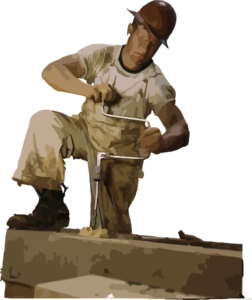New Jersey "Shot Itself in the Foot"
While the rest of the nation was impacted one way by the dictates of "No Child Left Behind," New Jersey was affected another way.

NCLB essentially demanded testing. Again, apparently to the outside world, the only way to judge whether teachers were teaching or students were learning was with data--numbers. The only way to get those numbers was through test scores. In fact, the very existence of schools themselves needed to be evaluated through numbers. Every child had to succeed, no children could fail despite handicaps of ability, social background or a hundred other factors that made each student unique. It was time to set down a strict bar everyone had to meet, regardless of talents, individual interests, strengths or weaknesses, And these were all academic standards.
Once again, I go off on a rant. Not everyone in the world is a master test taker. But everyone in the world excels at something. Vo-tech kids excel in their chosen, usually "hands-on" skills. They may not always be master scholars. But now it was our job to make them scholars--no matter what. Rant done.
Other states began to scramble. While some already had mandatory tests in place, many did not. Some had very basic tests, others, like New Jersey, more rigorous, demanding tests already in place. And here's where New Jersey was stuck. NCLB demanded the State to "up the ante" with its testing program. Raise the standards and raise the stakes.
Once again, at I'm sure great cost, the HSPT evolved into the HSPA--The High School Proficiency Assessment. New name, new test, and once again, new course materials. Ah, how happy all those so-called "learning "corporations" must have been. And NJ kids needed to succeed at a brand new level of expertise in test taking.
Meanwhile, to help all this along, our school bought into something called the NWEA. (Northwest Evaluation Association) computer based testing. Twice a year, students took a computerized test that was supposed to evaluate their learning as it progressed. Then the data provided by those tests was supposed to be supplied to the classroom teachers for use in developing individualized learning programs for each student based upon data analysis. Days of class time were used for this testing. I, at the time, had a computer lab as my classroom and had to roam about the building to find places to conduct my regular classes while my room was being used to test other students.
The test had no impact on student grades, so many times our kids would just go through the motions of testing, not necessarily doing their best just because the test didn't mean much to them. I remember a workshop or two on how to use the test results in my own classroom, but to be honest, I'm really not convinced the scores had a lot of influence on most of us teachers. We were already hard at work developing lessons on our own to help our students succeed and when you have a class load of perhaps 125 students or so every day, it does get rather overwhelming trying to tailor lessons to each student's individual needs.

But, we had the data. Nice numbers and nice graphs, and nice charts and a happy NWEA company getting paid all kinds of money. Oh, and I must admit, testing did help assure that the computer network and hardware was working just fine. (Can't knock the technical department in our system. Those guys were great about keeping things working for me. Our computers were not just for show, they were used in all phases of instruction.)
So now, in addition to the ever present days of HSPA testing, we had days of NWEA testing. At this point, at least our students were getting lots of experience taking tests. Hard to say what else they may have learned in between, but they were testing stars.
Meanwhile HSPA kept promising to expand. At first it was just impacting the English and math classes directly. But on the horizon loomed tests in science, history, and who knows what. The whole school was being required to focus on test skills and "reading and writing across the curriculum" became part of the mantra. (OK, I think math was across the curriculum too but I never quite heard it expressed that way. I do know our career--shop teachers--were expected to incorporate both math and reading/writing skills into their courses.) Now, everyone was involved in "teaching to the test." It was kind of a great big remediation effort.
HSPA loomed on the horizon, ready to pounce.
And, oh, yes, we dare not leave any child behind.
#PAARC #HSPA #standardized tests #education









 Somewhere along the way, the concept of team teaching emerged. We "regular" English teachers were assigned one of the remedial teachers as a classroom partner. Mine was a wonderful teacher and she and I clicked immediately. We managed to find all kinds of ways to work together in the classroom both sharing teaching duties and taking turns.
Somewhere along the way, the concept of team teaching emerged. We "regular" English teachers were assigned one of the remedial teachers as a classroom partner. Mine was a wonderful teacher and she and I clicked immediately. We managed to find all kinds of ways to work together in the classroom both sharing teaching duties and taking turns.

